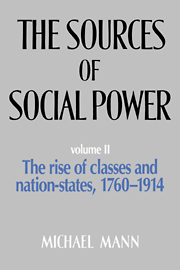Book contents
- Frontmatter
- Contents
- Preface
- 1 Introduction
- 2 Economic and ideological power relations
- 3 A theory of the modern state
- 4 The Industrial Revolution and old regime liberalism in Britain, 1760–1880
- 5 The American Revolution and the institutionalization of confederal capitalist liberalism
- 6 The French Revolution and the bourgeois nation
- 7 Conclusion to Chapters 4–6: The emergence of classes and nations
- 8 Geopolitics and international capitalism
- 9 Struggle over Germany: I. Prussia and authoritarian national capitalism
- 10 Struggle over Germany: II. Austria and confederal representation
- 11 The rise of the modern state: I. Quantitative data
- 12 The rise of the modern state: II. The autonomy of military power
- 13 The rise of the modern state: III. Bureaucratization
- 14 The rise of the modern state: IV. The expansion of civilian scope
- 15 The resistible rise of the British working class, 1815–1880
- 16 The middle-class nation
- 17 Class struggle in the Second Industrial Revolution, 1880–1914: I. Great Britain
- 18 Class struggle in the Second Industrial Revolution, 1880–1914: II. Comparative analysis of working-class movements
- 19 Class struggle in the Second Industrial Revolution, 1880–1914: III. The peasantry
- 20 Theoretical conclusions: Classes, states, nations, and the sources of social power
- 21 Empirical culmination – over the top: Geopolitics, class struggle, and World War I
- Appendix: Additional tables on state finances and state employment
- Index
8 - Geopolitics and international capitalism
Published online by Cambridge University Press: 04 August 2010
- Frontmatter
- Contents
- Preface
- 1 Introduction
- 2 Economic and ideological power relations
- 3 A theory of the modern state
- 4 The Industrial Revolution and old regime liberalism in Britain, 1760–1880
- 5 The American Revolution and the institutionalization of confederal capitalist liberalism
- 6 The French Revolution and the bourgeois nation
- 7 Conclusion to Chapters 4–6: The emergence of classes and nations
- 8 Geopolitics and international capitalism
- 9 Struggle over Germany: I. Prussia and authoritarian national capitalism
- 10 Struggle over Germany: II. Austria and confederal representation
- 11 The rise of the modern state: I. Quantitative data
- 12 The rise of the modern state: II. The autonomy of military power
- 13 The rise of the modern state: III. Bureaucratization
- 14 The rise of the modern state: IV. The expansion of civilian scope
- 15 The resistible rise of the British working class, 1815–1880
- 16 The middle-class nation
- 17 Class struggle in the Second Industrial Revolution, 1880–1914: I. Great Britain
- 18 Class struggle in the Second Industrial Revolution, 1880–1914: II. Comparative analysis of working-class movements
- 19 Class struggle in the Second Industrial Revolution, 1880–1914: III. The peasantry
- 20 Theoretical conclusions: Classes, states, nations, and the sources of social power
- 21 Empirical culmination – over the top: Geopolitics, class struggle, and World War I
- Appendix: Additional tables on state finances and state employment
- Index
Summary
Theoretical perspectives
This chapter is an attempt to explain the overall relations between geopolitics and capitalism through the “long nineteenth century.” Yet it also weaves a third term into the equation: European (becoming Western) civilization. Europe had long been a multi-power-actor civilization embodying an inherent contradiction: geopolitically highly competitive unto war, yet regulated by common norms. Eighteenth-century war became more destructive and costly, yet also more profitable for the Great Powers and also partly regulated by transnational institutions and by multistate diplomacy. Society had two levels, of the state and of Europe. The enormous surge in collective power generated by capitalism and industrialism burst into this half-regulated, two-level world, carrying contradictory transnational, national, and nationalist implications.
1. Revolutions in ideological and economic power relations boosted a partly transnational civil society (as Chapter 2 notes). Networks of discursive, moralizing literacy penetrated state boundaries; private-property rights were institutionalized throughout Europe, largely autonomous of states. Thus capitalist expansion might blow away state rivalries. Europe might industrialize transnationally to become the core of a global economy and society, as most nineteenth-century writers expected.
We can separate “strong” and “weak” versions. The strong version would predict the virtual demise of states. Transnational classes would be pacific. Universal peace might ensue, hoped liberals from Kant to John Stuart Mill. State infrastructures might remain to aid capitalist development, but the old military states would be swept away.
- Type
- Chapter
- Information
- The Sources of Social Power , pp. 254 - 296Publisher: Cambridge University PressPrint publication year: 1993



